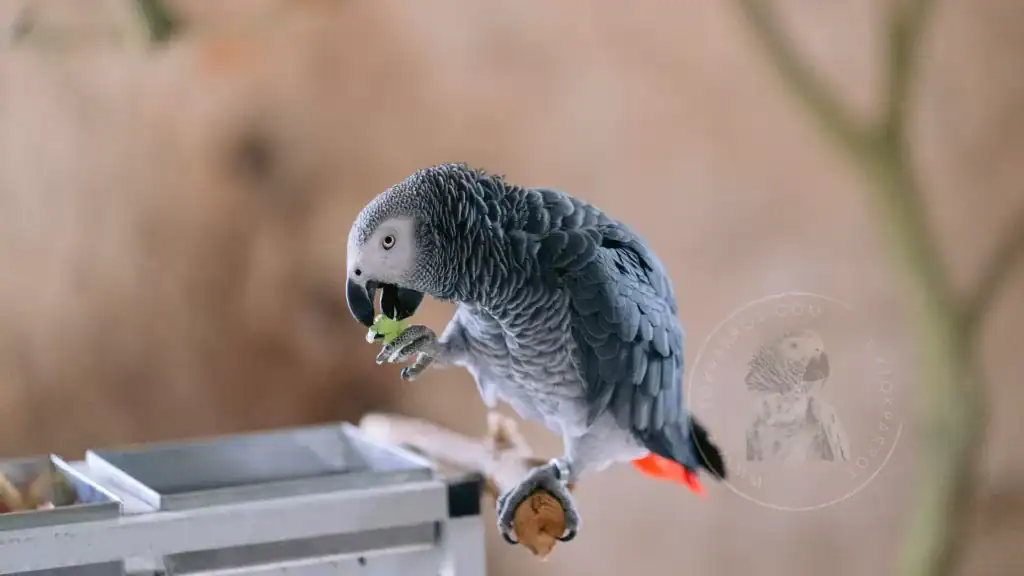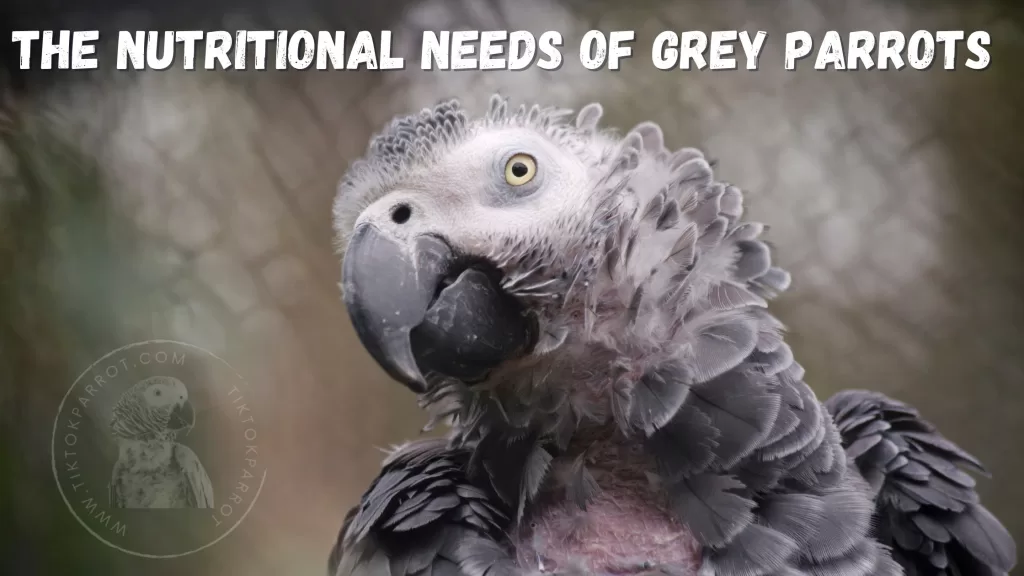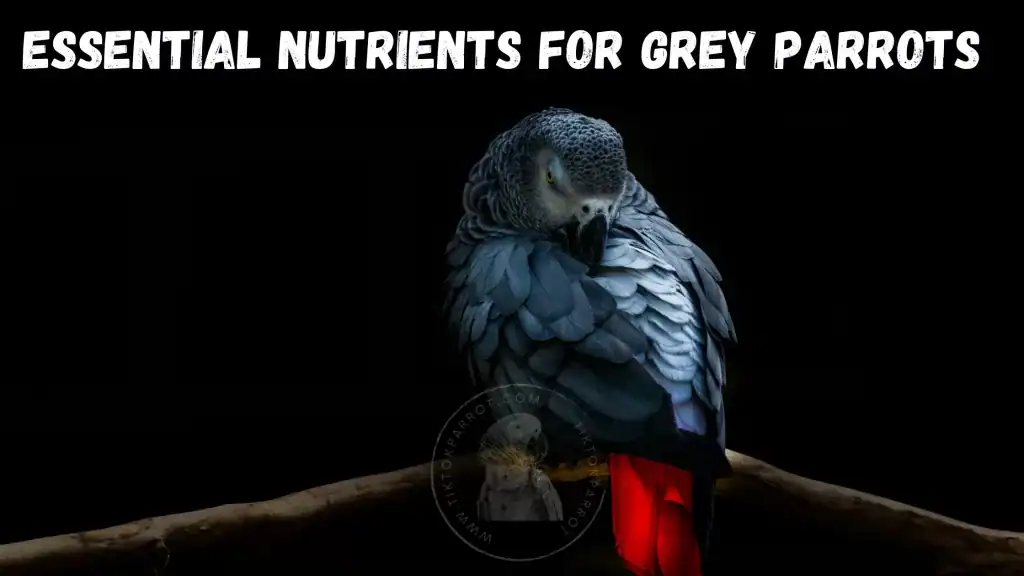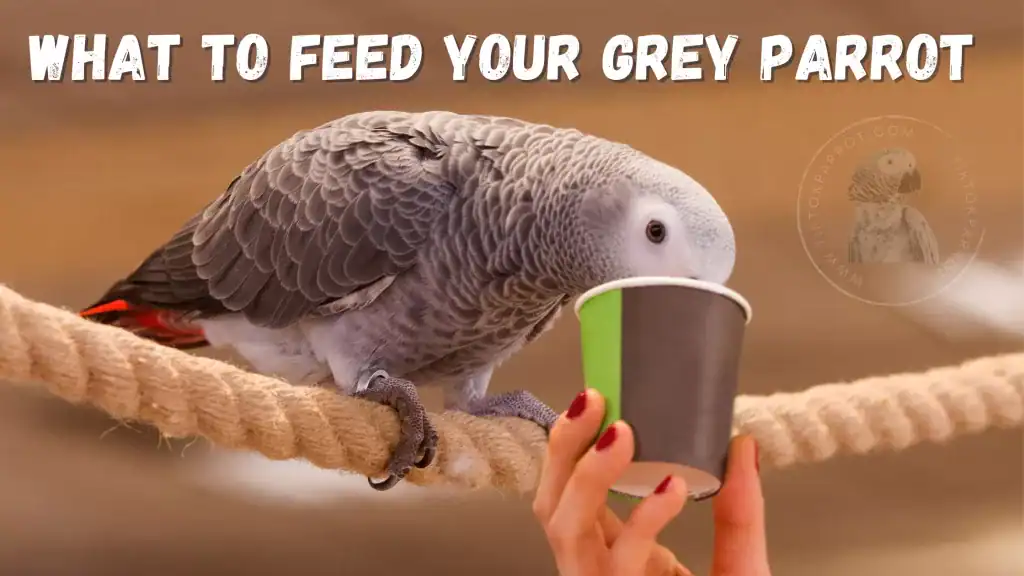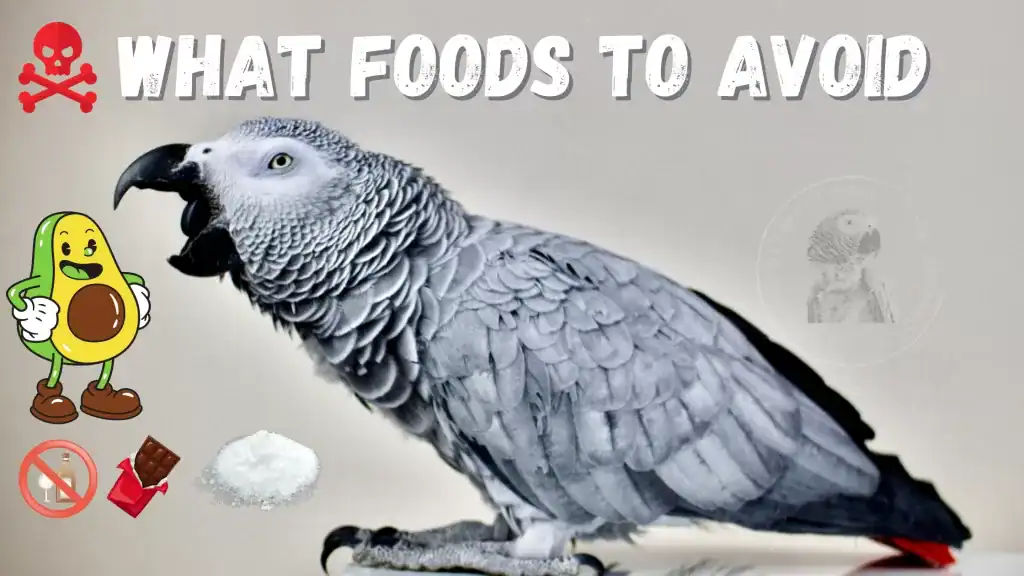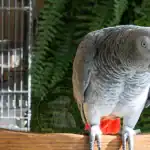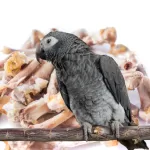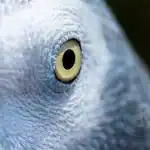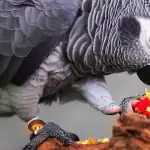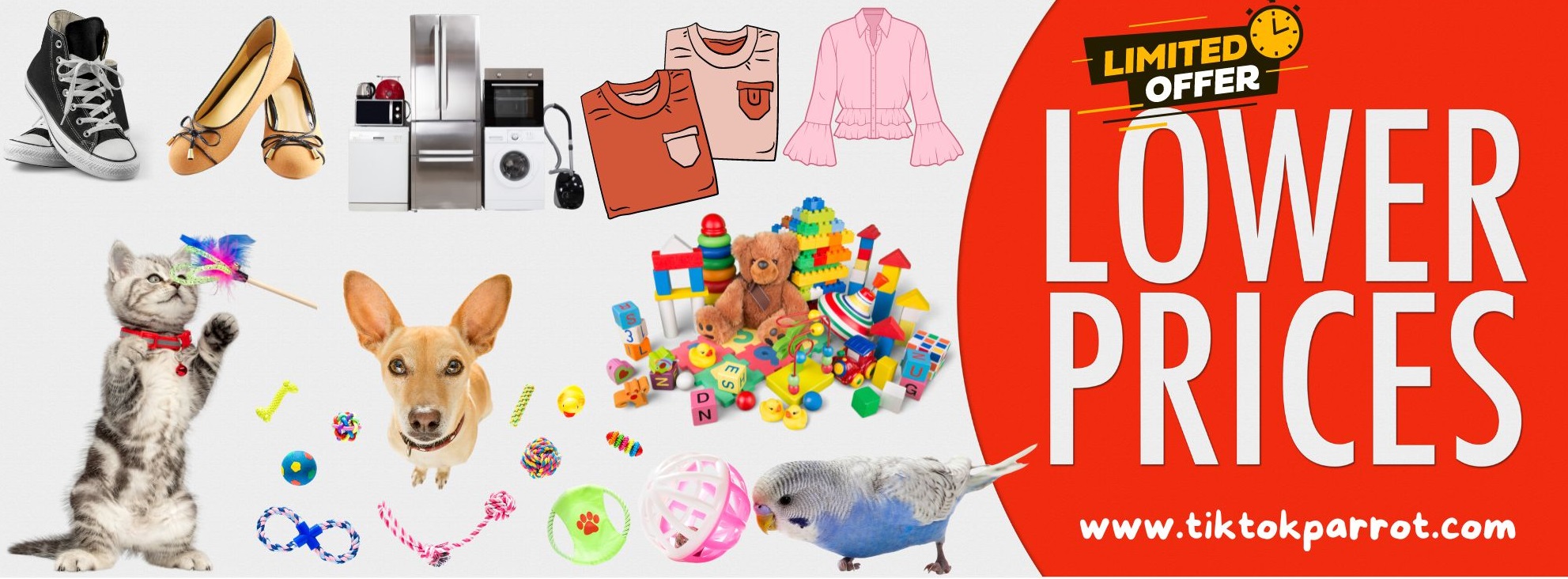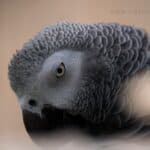As a responsible pet owner, you want to ensure that your feathered friend is happy, healthy, and living its best life. One of the most important factors in achieving this is through providing them with a healthy and balanced diet.
When it comes to Grey parrots, proper nutrition is crucial to their overall well-being. One crucial aspect of their well-being is their diet. While it may seem like a small issue, your grey parrot’s diet matters more than you think. In this article, we will explore why your Grey Parrot’s diet matters more than you think.
Discover the importance of your Grey parrot’s diet for its overall health and well-being. Learn what to feed them, what to avoid, and how to make sure they are getting all the nutrients they need.
First we will discuss the importance of a proper diet for your grey parrot and provide tips for ensuring they receive the necessary nutrients for optimal health.
The Nutritional Needs of Grey Parrots
Nutrition plays a vital role in the overall health and wellbeing of grey parrots. As a responsible parrot owner, it is essential to understand their nutritional needs and provide them with a balanced diet that meets their specific requirements.
In this comprehensive guide, we will delve into the topic of the nutritional needs of grey parrots and provide you with all the information you need to ensure that your feathered friend is healthy and happy.
African grey parrots are known for their high intelligence and long lifespan, which means they need proper nutrition to maintain their health for many years. In the wild, grey parrots feed on a variety of foods, including fruits, nuts, seeds, and insects.
These birds are popular pets due to their intelligence, affectionate nature, and ability to mimic human speech. To keep them healthy and happy, it is crucial to provide them with a balanced and nutritious diet that meets their specific nutritional needs.
In captivity, it is important to mimic this natural diet as closely as possible. A diet high in fruits and vegetables provides essential vitamins and minerals, while a seed-based diet lacks many of these vital nutrients.
Many pet stores sell seed-based diets, which can lead to malnutrition, obesity, and a weakened immune system. If your grey parrot is currently on a seed-based diet, it is crucial to slowly introduce fresh fruits and vegetables into their diet to ensure a balanced and healthy meal plan.
Essential Nutrients for Grey Parrots
Greys require a balanced diet that is rich in essential nutrients such as protein, fat, carbohydrates, vitamins, and minerals. Protein is essential for growth, repair, and maintenance of body tissues, while fat provides energy and is important for maintaining healthy skin and feathers.
Carbohydrates provide energy and are essential for maintaining a healthy digestive system, while vitamins and minerals are required for various metabolic processes in the body.
These birds require high-quality protein sources such as cooked chicken, turkey, and fish. They can also be fed boiled eggs, cooked legumes, and nuts such as almonds, walnuts, and cashews.
Fruits and vegetables are an essential part of a grey parrot’s diet. They provide essential vitamins, minerals, and fiber. Good choices include apples, bananas, oranges, grapes, carrots, sweet potatoes, kale, and spinach.
The Benefits of a Healthy Diet
A healthy diet can have many benefits for your grey parrot. Proper nutrition can improve their immune system, increase their energy levels, and even improve their mood. Additionally, a balanced diet can help prevent common health issues in grey parrots, such as feather plucking and egg binding.
Providing a diverse and balanced diet can also stimulate your grey parrot’s natural foraging instincts, providing both physical and mental stimulation. This can improve their overall quality of life and reduce behavioral issues such as aggression or boredom.
What to Include in Your Grey Parrot’s Diet
So, what should you include in your grey parrot’s diet? A healthy meal plan for your grey parrot should consist of:
- Fresh fruits and vegetables: These should make up the majority of your grey parrot’s diet. Good options include leafy greens, carrots, sweet potatoes, apples, bananas, and berries.
- Whole grains: Grains such as brown rice and quinoa provide essential carbohydrates and fiber.
- Nuts and seeds: These should be given in moderation, as they are high in fat. Good options include almonds, walnuts, pumpkin seeds, and sunflower seeds.
- Pellets: High-quality pellets should be included in your grey parrot’s diet to ensure they receive all necessary nutrients. Look for pellets that contain whole grains, fruits, and vegetables.
I will explain further about safe and healthy food below as you read through 🙂
Tips for Implementing a Healthy Diet for Your Grey Parrot
Now that you know the importance of a healthy diet for your grey parrot, it’s time to implement it. Here are some tips to ensure your feathered friend receives the necessary nutrients for optimal health:
- Introduce new foods gradually: Grey parrots can be picky eaters, so it’s essential to introduce new foods slowly. Start by adding a small amount of a new food to their diet and gradually increase it over several weeks.
- Provide a variety of foods: Grey parrots need a diverse diet to ensure they receive all necessary nutrients. Rotate their food choices regularly to keep them interested and provide a variety of colors, textures, and flavors.
- Avoid toxic foods: Some foods can be toxic to grey parrots, including chocolate, caffeine, and avocado. Ensure you are aware of what foods to avoid and keep them out of your feathered friend’s reach.
- Monitor their weight: Grey parrots can quickly become overweight, leading to health issues such as liver disease and heart problems. Monitor their weight regularly and adjust their diet accordingly.
- Provide fresh, clean water: Ensure your grey parrot has access to fresh, clean water at all times. Change their water daily and clean their water bowl regularly.
By implementing these tips, you can ensure your grey parrot receives the necessary nutrients for optimal health.
What to Feed Your Grey Parrot
Grey Parrots require a diet that is high in nutrients to keep them healthy and happy. The base of their diet should consist of high-quality pellets, which are designed to provide them with all the necessary nutrients. Pellets are essential as they ensure that your Grey parrot is getting a balanced diet.
However, pellets alone cannot provide all the nutrients your Grey needs. It is important to supplement their diet with fresh fruits, vegetables, and grains. These foods provide additional vitamins, minerals, and fiber.
Some of the best fresh fruits and vegetables for your Grey Parrot include:
- Apples
- Grapes
- Bananas
- Oranges
- Carrots
- Peas
- Broccoli
- Spinach
In addition to fresh fruits and vegetables, grains such as brown rice, quinoa, and whole wheat bread can be added to their diet in moderation.
Nutrients Your Grey Parrot Needs
African Grey parrots require a variety of nutrients to maintain their health. Some of the essential nutrients include:
- Protein: for growth and maintenance of muscles
- Carbohydrates: for energy
- Vitamins: for maintaining good health
- Minerals: for healthy bones and feathers
- Fats: for energy and maintenance of healthy skin and feathers
It is important to make sure your Grey’s diet contains all of these nutrients.
What Foods to Avoid
As a responsible pet owner, it is essential to know what foods to avoid feeding your grey parrot. Some of the foods that are toxic to grey parrots include chocolate, caffeine, alcohol, avocado, and foods that are high in fat or salt.
There are certain foods that should be avoided when feeding your Grey Parrot. These include:
- Chocolate
- Avocado
- Alcohol
- Caffeine
- Salt
- Sugar
- Junk food
These foods can be toxic to Grey parrots and can cause health problems such as obesity, liver damage, and digestive issues. With my own mistake, I have lost my beloved Mitthu (TiktokParrot) by feeding avocado, please make sure you never do that mistake. I regret it so much, so badly and I wish if I could reverse the time. 🙁
The Importance of Water
Water is just as important as food when it comes to your Grey Parrot’s diet. Make sure your Grey Parrot always has access to clean and fresh water. Change their water at least once a day and provide water in a bowl that is large enough for them to bathe in.
How to Make Sure Your Grey Parrot is Getting All the Nutrients They Need
To make sure your Grey Parrot is getting all the nutrients they need, you should:
- Provide them with a variety of fresh fruits and vegetables
- Supplement their diet with high-quality pellets
- Avoid giving them foods that are toxic to them
- Provide them with fresh water at all times
Grey parrots require fresh, clean water daily. They should have access to water at all times, and their water dish should be cleaned and refilled daily. You can also talk to your vet about any dietary concerns you may have and get their expert opinion on what to feed your Grey Parrot.
How Much Should You Feed Your Grey Parrot?
Feeding your grey parrot can be a bit tricky, especially if you’re a new pet owner. One of the most common questions asked by pet owners is how much should you feed your grey parrot?
These intelligent creatures require a balanced and nutritious diet to maintain optimal health and wellbeing. However, determining how much to feed your grey parrot can be a daunting task, especially for new owners.
Overfeeding or underfeeding can lead to serious health problems such as obesity, malnutrition, and digestive issues.
Greys should be fed twice a day, with a total of 1-1.5 ounces of food per feeding. The amount of food your grey parrot needs may vary depending on their size, age, and activity level. It is essential to monitor your parrot’s weight and adjust their food intake accordingly.
Frequently Asked Questions about Grey Parrot Diet
Q: Can Grey parrots eat seeds?
A: While seeds are a part of a Grey parrot’s natural diet, they should not make up the majority of their diet. Seeds are high in fat and low in nutrients, so it’s important to supplement their diet with other foods such as pellets, fruits, and vegetables.
Q: Can Grey parrots eat nuts?
A: Nuts can be a healthy part of a Grey’s diet, but they should be given in moderation. Nuts are high in fat and calories, so too many can lead to weight gain and other health problems. Some of the best nuts to feed your Grey Parrot include almonds, walnuts, and pecans.
Q: How often should I change my Grey parrot’s diet?
A: It’s important to make changes to your Grey parrot’s diet gradually to avoid digestive upset. You can introduce new foods slowly over a period of several weeks. Once your Grey parrot is used to a new food, you can gradually increase the amount until it makes up a significant part of their diet.
Q: Can Grey parrots eat human food?
A: While some human foods are safe for Grey parrots, it’s important to be careful about what you feed them. Many human foods are high in salt, sugar, and fat, which can be harmful to Grey Parrots. It’s best to stick to foods that are specifically designed for Grey Parrots.
Q: How often should I give my Grey parrot fresh fruits and vegetables?
A: Fresh fruits and vegetables should be a regular part of your Grey parrot’s diet, and should be offered daily. Make sure to offer a variety of fruits and vegetables to ensure they are getting all the necessary nutrients.
Q: How do I know if my Grey parrot is overweight?
A: Grey parrots should have a healthy body weight, with a slight curve to their breastbone. You should be able to feel their breastbone without too much pressure, but it should not be visible. If your Grey Parrot is overweight, they may have difficulty flying, and may be at risk for health problems such as fatty liver disease.
Q: Can I give my Grey parrot supplements without consulting a vet?
A: It’s important to consult a vet before giving your Grey any supplements, as some supplements can be harmful if given in excessive amounts. Your vet can help you determine if your Grey needs supplements, and can recommend the appropriate type and dosage.
Q: Can Grey parrots eat dairy products?
A: Greys are lactose intolerant, and should not be given dairy products such as milk, cheese, or yogurt. These foods can cause digestive upset and other health problems.
Q: Can Grey parrots eat spicy foods?
A: Grey parrots have sensitive digestive systems and should not be given spicy or highly seasoned foods. These foods can cause digestive upset and other health problems.
Q: Can Grey parrots eat seeds with shells?
A: Grey parrots can eat seeds with shells, but it’s important to make sure the shells are clean and free of pesticides. You can also buy pre-shelled seeds, which are easier for your Grey parrot to eat.
Q: What should I do if my Grey parrot is not eating?
A: If your Grey parrot is not eating, it’s important to consult a vet. Loss of appetite can be a sign of a medical problem, and your vet can help determine the cause and recommend appropriate treatment.
Q: Can Grey parrots eat frozen fruits and vegetables?
A: Grey Parrots can eat frozen fruits and vegetables, but it’s important to make sure they are thawed and at room temperature before offering them to your Grey parrot. Cold or frozen foods can be difficult for your Grey parrot to digest.
Q: Can Grey parrots eat insects?
A: Grey parrots are omnivores and can eat insects, but they should be offered in moderation. Insects should be free of pesticides and other harmful chemicals, and should be cooked before offering them to your Grey parrot.
Q: Can Grey Parrots eat honey?
A: Grey parrots can eat honey in moderation, but it should not make up a significant part of their diet. Honey is high in sugar and can lead to weight gain and other health problems if given in excess.
Q: How often should I clean my Grey parrot’s food and water bowls?
A: You should clean your Grey parrot’s food and water bowls daily to prevent the growth of harmful bacteria. Wash the bowls with hot, soapy water, and rinse thoroughly before refilling them with fresh food and water.
Final Thoughts
A healthy diet is crucial for your grey parrot’s overall health and well-being. Providing a diverse and balanced meal plan high in fresh fruits and vegetables, whole grains, nuts, seeds, and pellets can improve their immune system, energy levels, and even their mood. By implementing the tips provided, you can ensure your feathered friend lives a long and healthy life.
Remember, a healthy diet is just one aspect of caring for your grey parrot. Regular exercise, mental stimulation, and veterinary care are also essential for their overall health and well-being.
If you found this blog helpful, It would be great if you could share it with your family and friends who might find it useful as well.
You might like to read these as well 🙂
African Grey Parrots: The Ultimate Guide to Care and Training
Frequently Asked Questions About African Grey Parrots
Frequently Asked Questions About African Grey Parrot Toys
5 Reasons Why Your Parrot Needs Toys: The Importance of Mental & Physical Stimulation
Pet Accessory Hacks: DIY Tips to Personalize Your Pet’s Gear
Grey Parrots as Emotional Support Animals: How They Helped Me Through My Darkest Times
The Battle of the Birds: African Grey Parrot vs Macaw
African Grey Parrot Male or Female? (Determine Gender of African Grey)
Is Your African Grey a Jealous Bird? Here’s What You Need to Know!
What diseases can African Grey parrots get?
Uncover the Fascinating World of Parrot Tongue Anatomy and Function
Types of African Grey Parrots
For more useful content about African grey parrots, you can subscribe my site with your email to get notification upon publishing a new blog, the subscribe box you can see on the right side of this page. Also if you get an alert on your web browser while browsing my site, allow it and that will also give you an alert whenever I publish a new blog. 🙂
Stay safe and much love !


If you are interested in supporting me, kindly consider utilizing my affiliate link for your Amazon purchases. Your support would be greatly appreciated.

